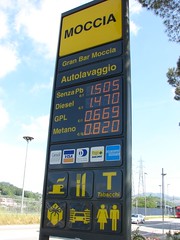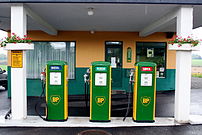- Ten Things You Won't See After The Recession. I guess I should expect a Silicon-Valley-centric view of the recession from PC World, but I'm still disappointed to see supposedly tech-savvy magazines publishing articles that don't offer a single-page view. Boo!
- Henry Blodget on why Wall Street still has boom-bust cycles. Anybody who refers to the "current credit bubble" and doesn't mention the aging of Baby Boomers is talking nonsense.
exercises in compound storytelling
Showing posts with label economics. Show all posts
Showing posts with label economics. Show all posts
Wednesday, December 24, 2008
still thinking about the recession, etc.
Here are two quick recession-related links:
Thursday, December 4, 2008
recession predictions
 Image via WikipediaFirst of all let's deal with a couple of simple questions: what's a recession and what's a depression?
Image via WikipediaFirst of all let's deal with a couple of simple questions: what's a recession and what's a depression?A recession occurs when business activity declines. A depression occurs when business activity declines a lot.
Here is the first article I've seen that tells me part of what I want to know: it compares the current climate, measured mostly by the unemployment rate, to a handful of other recessions and to the Great Depression. The problem here is that rising unemployment is a consequence of a decline in economic activity, but it isn't a measure of economic activity itself. For that you need to look at Gross Domestic Product (GDP) or Gross National Product (GNP).
Given that the average length of the ten recessions since World War II has been 10.4 months, with a range of 6 months in the 1980 recession to 16 months in the 1981-82 one, the natural "placeholder" time frame for the end of this recession would appear to be the middle of 2009.
I think that means that the current recession is "long" and "shallow," because it has gone on more than eleven months (longer than average) and the unemployment rate is 6.5%.
I'm still looking for a resource that will identify all the recessions that have occurred since 1933 and describe then in terms of GNP, GDP, and unemployment rates.
This is still a lousy analysis, though, because it just looks at three numbers and it doesn't do anything resembling a principal factor analysis: it doesn't identify and measure the significant proximate causes of these recessions.
Right now I'd have to say that the current problems have been caused by a housing bubble, bad debts, a contraction in available commercial credit, a shortage of household savings, with an undercurrent of maybe a shift in demographics: Baby Boomers are getting older and starting to change their saving and spending habits. Oh and of course the Iraq War.
The Great Depression had widespread bankruptcies, runs on banks, natural disasters, and anarchy. I'm not sure what else. Time to do some reading, I suppose.
There's just no point in talking about a decline in unemployment and an increase in GDP unless and until we can identify the underlying causes of the current contraction.
Saturday, November 8, 2008
more about gas vs. diesel
 Image by Cool Pixels via FlickrNormand Miron was kind enough to provide this link; the discussion of gas and diesel prices is in the comments:
Image by Cool Pixels via FlickrNormand Miron was kind enough to provide this link; the discussion of gas and diesel prices is in the comments:- Diesel demand is relatively constant, while gas demand fluctuates. This means that over the short term fuel companies can raise prices incrementally without losing business.
- American use of diesel and gas are out of balance relative to the ratio in which they are typically produced, and as a result there's a shortage of diesel refining capacity without there being a corresponding shortage of gasoline refining capacity.
Tuesday, November 4, 2008
diesel fuel vs. gasoline
 Image via WikipediaI'm listening to an old episode of Crosstalk America, where host Vic Eliason interviews E. Calvin Beisner, national spokesman for the Cornwall Alliance for the Stewardship of Creation and author of Where Garden Meets Wilderness: Evangelical Entry into the Environmental Debate.
Image via WikipediaI'm listening to an old episode of Crosstalk America, where host Vic Eliason interviews E. Calvin Beisner, national spokesman for the Cornwall Alliance for the Stewardship of Creation and author of Where Garden Meets Wilderness: Evangelical Entry into the Environmental Debate.The first segment moves pretty quickly, touching on global warming, abortion, etc. and most of it I won't rehash here.
Vic asks why diesel fuel is more expensive than gasoline, given that diesel can be refined more cheaply. This is a puzzle: diesel used to be less expensive, but that changed a few years ago. At the top of the recent fuel spike there was nearly a dollar spread between diesel and gasoline locally. Eliason and Beisner more or less agree that taxes are the problem.
The best answer I've found so far is here, a column with Steven Cole Smith interviewing Ted Haberkorn. It's from 2005, as best I can tell, and it says that refining costs for gasoline are lower, taxes are roughly the same percentage of the price: taxes are higher for diesel in dollars, but roughly 16% of the total price:
According to the federal government's Energy Information Administration (EIA) statistics, diesel has been gaining on regular gasoline from about 1994 to the fall of 2004, when, for the most part, diesel became more expensive.
Helpfully, the EIA offers a breakdown of that $3.10-a-gallon diesel from October: 16 percent of the $3.10 goes to taxes, 10 percent to distribution and marketing, 29 percent for refining, 45 percent for crude oil.
Compare that to the breakdown on a gallon of regular gas from October, which cost $2.72. Of that, 16 percent went to taxes, 18 percent to distribution and marketing, 15 percent to refining, 51 percent to crude oil.
The article concludes that hurricanes disrupted supply and refining capacity in 2004, but that the spread was still positive in 2005 because the market would bear it.
Commodity prices are funny things: futures tend to smooth out prices, making supply and prices more stable; I wouldn't be surprised if there weren't a futures-market aspect to diesel vs. gasoline spread, too.
Subscribe to:
Posts (Atom)
![Reblog this post [with Zemanta]](http://img.zemanta.com/reblog_c.png?x-id=ee0d22a2-6b1c-479d-a825-51afee42e8a8)
![Reblog this post [with Zemanta]](http://img.zemanta.com/reblog_c.png?x-id=6d4b0adb-1110-40d6-85c5-981371846c82)
![Reblog this post [with Zemanta]](http://img.zemanta.com/reblog_c.png?x-id=193c037e-b255-4557-a7e2-f039e514bc74)
![Reblog this post [with Zemanta]](http://img.zemanta.com/reblog_c.png?x-id=f94d6b56-3182-41a2-9d5b-e5fcb6946f74)
